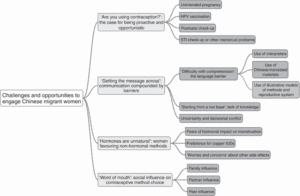 This paper was published (initially as early access online) in Sexual Health on 1 October 2020. This has been published as open access, and the full-text and PDF are available from the journal website: https://doi.org/10.1071/SH19215
This paper was published (initially as early access online) in Sexual Health on 1 October 2020. This has been published as open access, and the full-text and PDF are available from the journal website: https://doi.org/10.1071/SH19215
Dolan H, Li M, Bateson D, Thompson R, Tam CWM, Bonner C, Trevena L. Healthcare providers’ perceptions of the challenges and opportunities to engage Chinese migrant women in contraceptive counselling: a qualitative interview study. Sexual Health 2020;17(5):405-13 https://doi.org/10.1071/SH19215
Abstract
Background: In Australia, there are many culturally and linguistically diverse communities and Chinese migrants make up one of the largest. Yet, little is known about healthcare providers’ (HCPs) unique experiences in providing contraceptive care for Chinese migrant women. There is minimal research into the HCPs’ perceptions of challenges or opportunities in engaging Chinese migrant women in informed and shared decision-making processes during contraceptive counselling. The aim of this study is to explore HCPs’ experiences of providing contraceptive care for Chinese migrant women, their perceptions of women’s care needs when choosing contraceptive methods, as well as their own needs in supporting women’s decision-making. Methods: Semi-structured interviews were conducted with 20 HCPs in Sydney, Australia who had substantial experience in providing contraceptive services to Chinese women who were recent migrants. Transcribed audio-recorded data were analysed using thematic analysis. Results: Four main themes were identified, including: ‘Are you using contraception?’: the case for being proactive and opportunistic; ‘Getting the message across’: barriers to communication; ‘Hormones are unnatural?’: women favouring non-hormonal methods; and ‘Word of mouth’: social influence on contraceptive method choice. Conclusions: In order to facilitate informed choice and shared decision-making with Chinese migrant women during contraceptive counselling, broader health system and community-level strategies are needed. Such strategies could include improving HCPs’ cultural competency in assessing and communicating women’s contraceptive needs; providing professional interpreting services and translated materials; and improving women’s health literacy, including their contraceptive knowledge and health system awareness.
